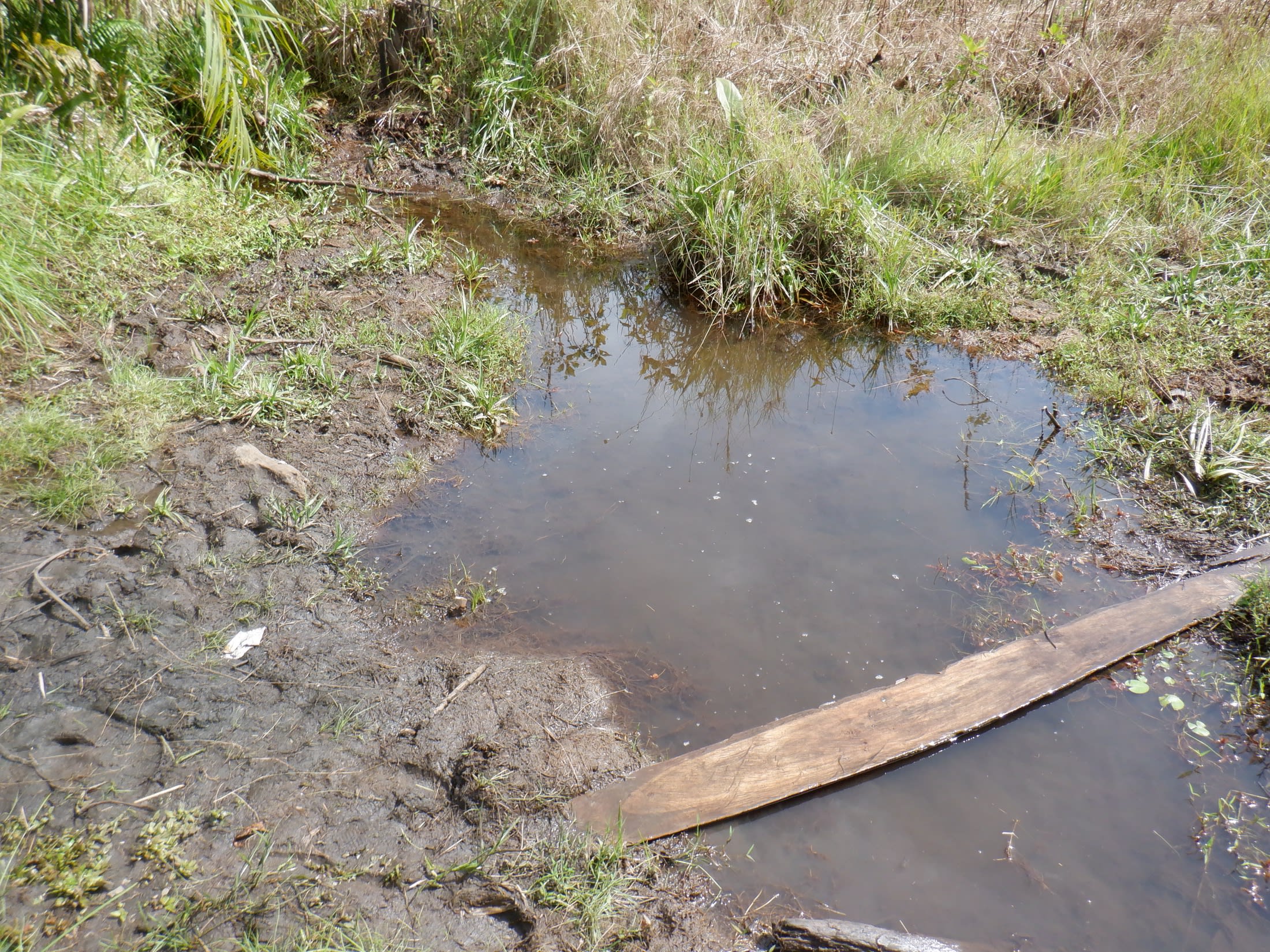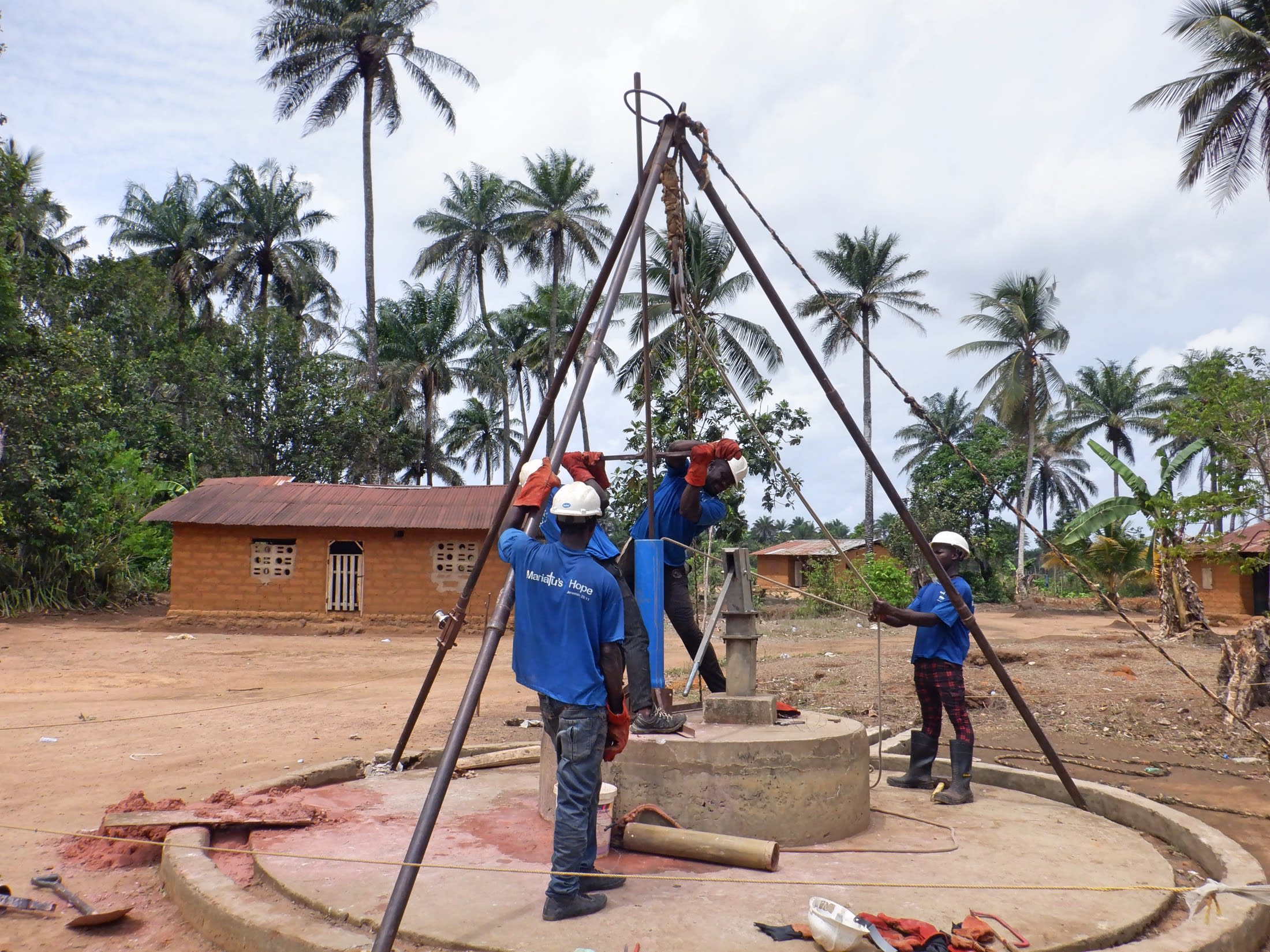March, 2024: Rogbathen Community Well Rehabilitated!
We are excited to share that a safe, reliable water point at Rogbathen Community in Sierra Leone is now providing clean water to community members! We also conducted hygiene and sanitation training, focusing on healthy practices such as handwashing and latrines.

"The completion of this water point is a great help for me in my educational aspirations. I'm happy I now have a hand pump at my doorstep; this will help me focus more on my education. Previously, I did not have enough time to read my notebooks. Before school in the morning, I would fetch water from the stream, sweep the compound, and wash all the dirty plates and pots. After school, I must go to the stream again to fetch water for my mother to prepare food for the family. By the time I finish all this domestic work, it is late evening, and I'm tired. But now that I have this water point in my community, all these problems are over. No more low grades, no more lateness for school, no more going to the stream late in the evening. After school, I will just help my mother prepare the food, take my book, and read. May Allah bless Mariatu's Hope and The Water Project for helping us to achieve our goals," shared 15-year-old Mariatu.

Mariatu (yellow shirt) celebrating.
Twenty-seven-year-old trader and farmer Ramatu Kamara shares Mariatu's excitement.
She said, "With this new water point in my community, I will now achieve my goals. As a farmer, I need to go to my farm early in the morning, so I will return to do my domestic work at home during the day. But because of the water constraints we have been going through, I always go to my farm late. I walk a long distance from the village to my farm; that alone is time-consuming. I always prepare food for my family late in the evening; sometimes, we even eat at night. But now that we have this new water point, I have enough time to sleep. I will go to my farm early instead of going to the stream to fetch water. The animals will no longer have a chance to destroy my crops. This year's harvest is going to be great for me and my family; I will make plenty of money to take care of my children. I believe I'm the happiest person in this community for this new water point. I am grateful to God Almighty for me to enjoy safe drinking water, and we are now free from all the waterborne sicknesses we used to contract during the rainy season."

Ramatu drinking clean water!
We held a dedication ceremony to officially hand over the well to the community members. Several local dignitaries attended the ceremony, including representatives from the Ministry of Water Resources and the Port Loko District Council. Each official gave a short speech thanking everyone who contributed to the rehabilitation of the water project and reminding everyone to take good care of it. Then, Mariatu and Ramatu made statements on their community's behalf. The ceremony concluded with celebration, singing, and dancing.

Clean Water Restored
The drill team arrived the day before beginning work. They set up camp and unpacked all their tools and supplies to prepare for drilling the next day. The community provided space for the team to store their belongings and meals for the duration of their stay. The following day, the work began.
First, we raised the tripod, the structure we use to hold and maneuver each drilling tool. Next, we measured the well's original depth. We then socketed the pipes and installed a casing.

Finally, we lined up the drill rods and started to drill! We reached a final depth of 15 meters with water at 10 meters. The hand-drill method allowed the team to install the cylinder far below the aquifer so that the community has excellent water access throughout the year.
With drilling complete, we installed screening and a filter pack to keep out debris when the water is pumped. We then cemented an iron rod to the well lining and fixed it with an iron collar at the top.

Constructing the base.
Next, we bailed the well by hand for three days and flushed it, clearing any debris generated by the drilling process. Finally, we tested the yield to ensure the well would provide clean water with minimal effort at the pump.

Yield test.
As the project neared completion, we built a new cement platform, walls, and drainage system around the well to seal it off from surface-level contaminants. The drainage system helps to redirect runoff and spilled water to help avoid standing water at the well, which can be uncomfortable and unhygienic and a breeding ground for disease-carrying mosquitoes.

The walls and drainage are complete!
At last, we installed the pump and conducted a water quality test. The test results showed that this was clean water fit for drinking!

New Knowledge
Before conducting any hygiene training, we called and visited the local water user committee to understand the community's challenges and lack of sanitation facilities. We shared the findings from our discussions with the committee members to help them make the necessary adjustments before the training began. For example, we identified households without handwashing stations or ones that may need to repair their latrines. With this information, community members worked together to improve hygiene and sanitation at home.
We also invited a nurse from the local clinic to help explain some topics and spread awareness about Sierra Leone's free vaccinations for children under five. The Chiefdom Health Inspector was also invited; having both parties participate in the training was instrumental.
After this preparatory period, we scheduled a time when members from each household using the water point could attend a three-day hygiene and sanitation training. We then dispatched our teams to the agreed-upon location to hold the meeting.
Training topics covered included handwashing and tippy taps, good and bad hygiene habits, teen pregnancy, worms and parasites, proper dental hygiene, menstrual hygiene, proper care of the well's pump, keeping the water clean, the cost recovery system, the importance of using dish racks and clotheslines, the importance of toilets, keeping latrines clean, balanced diets, the diarrhea doll, and disease transmission and prevention, COVID-19, Ebola, Hepatitis, HIV and AIDS.

Training session.
A notable topic of discussion was family planning, which was new to most of the participants. Another informative lesson related to healthcare. Many use traditional herbs to treat most afflictions, but they learned the importance of seeking medical care when ill or pregnant.

Ramatu shared her experience, "I'm happy to be part of this training, which has proved to be more valuable to me than I ever expected. I have learned many things during the three days of the training. I now know the importance of family planning and how we get worms in our bodies. Before this time, I was so reluctant to practice proper hygiene, especially washing my hands with soap after using the toilet. I am not used to such practices, but now that I have this new knowledge, I will refrain from all the bad hygiene practices I have been doing before. Thanks for sensitizing us on the importance of immunization [during] early pregnancy; some of us are victims of the act due to the ignorance of our parents. That is why some of us are suffering in the village with many children, no knowledge of family planning, and no knowledge of visiting the clinic during pregnancy for checkups. I now know that visiting the hospital when sick is more important to our health than drinking a pot full of local herbs and roots. The local herbs end up causing more damage to our vital organs, all in the name of treating malaria and typhoid. I'm so happy I was part of this training and have gained new knowledge, which I will practice daily. I will sensitize others who did not have this opportunity to learn about these lifesaving topics."
Conclusion
This project required a substantial collaboration between our staff, our in-country teams, and the community members. When an issue arises concerning the well, community members are equipped with the necessary skills to rectify the problem and ensure the water point works appropriately. However, if the issue is beyond their capabilities, they can contact their local field officers to assist them.
Also, we will continue to offer them unmatchable support as a part of our monitoring and maintenance program. We walk with each community, problem-solving together when they face challenges with functionality, seasonality, or water quality. Together, all these components help us strive for enduring access to reliable, clean, and safe water for this community.
With your contribution, one more piece has been added to a large puzzle of water projects. In Kenya, Uganda, and Sierra Leone, we're working toward complete coverage. That means reliable, maintained water sources within a 30-minute round trip for each community, household, school, and health center. With this in mind, search through our upcoming projects to see which community you can help next!
Thank you for making all of this possible!









 Borehole Well and Hand Pump
Borehole Well and Hand Pump
 Rehabilitation Project
Rehabilitation Project



























